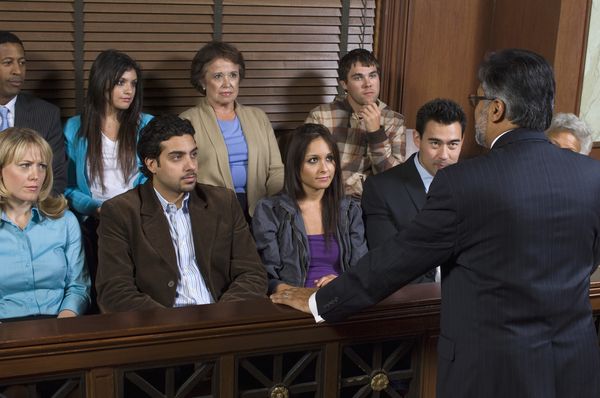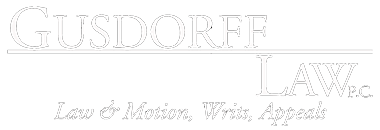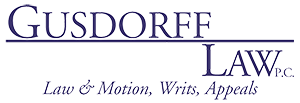The complexities of appellate practice make for plenty of potential landmines that can jeopardize a successful appeal. While some mistakes may at first seem incurable, there is often a way out of them. Working through an oversight or error takes patience and having a good handle on appellate procedure. You can count on the experienced and dedicated team at Gusdorff Law.
These are some common errors and how they may be fixed:
Failing to file the notice of appeal within 60 days of the notice of ruling
Note the phrase “notice of ruling” – not notice of entry. Generally, appellants have 60 days to appeal an adverse judgment or order if notice of entry is given. But notice of ruling is a different matter. An appellant is not barred from pursuing the appeal for failure to file the notice within 60 days of the notice of ruling.
The California Rules of Court do not equate notice of entry with notice of ruling. There are some cases in which the line between the two terms seems blurred. But in at least one California Court of Appeal matter, the opinion was that court rules should be applied strictly and literally. That means there must actually be a notice of entry before the 60-day clock begins to run.
Appealing the judgment but not the attorneys’ fees
Imagine the scenario in which the trial court rules against you. Contained within that adverse judgment is a determination that you must pay the opposing party’s attorneys’ fees. You timely appeal the judgment. Later, in a post-judgment order, the trial court determines the fees you must pay. You fail to appeal that order.
This is not a fatal error. The normal and best course of action would be to appeal the judgment and post-judgment attorneys’ fees order. The rules permit this and legal guides recommend it. But when a judgment decrees that a party must pay fees, an appeal of the judgment encompasses a later determination of entitlement to them. So although a separate appeal is permitted, it is not required for the court to review the post-judgment fees order to determine whether the party should have been awarded their attorneys’ fees. However, some courts do preclude parties who fail to separately appeal from the attorneys’ fee award to challenge the amount of that award.
If the judgment is ultimately reversed, any attorneys’ fees that were ordered disappear. As one decision put it, a “successful party is never required to pay the costs incurred by the unsuccessful party.”
The Court of Appeal affirms an adverse judgment for an issue the parties didn’t raise
Assume that you have appealed an adverse judgment but the Court of Appeal affirms it. However, in doing so, the Court relies on an issue not briefed or raised on appeal.
We all know that, in general, this is not how the Court of Appeal should operate. When the Court makes a decision in such a manner, the parties are denied the opportunity to weigh in. Enter the petition for rehearing.
Courts typically are loath to hear petitions for rehearing, especially considering their immense backlog. This, in turn, discourages some attorneys from using them. But by law, a petition for rehearing must be granted if:
- The Court of Appeal decision was based on an issue not raised or briefed by any party; and
- The Court did not afford the parties the chance to present supplemental briefs on the issue
Of course, whether a matter was properly briefed by a party may be up for debate. The determinative question is whether the matter was “fairly encompassed” in the brief. This presents a complexity that, like most such issues, requires input from experienced appellate counsel.
Serving Your California Appellate Legal Needs From Start To Finish
A mistake which may at first seem unfixable need not necessarily be treated as such. Even if you think you’ve made a serious error related to the appeal, let us review your case. There may be a way to correct the matter. Gusdorff Law represents appellants in a wide range of practice areas. Call us today to learn more.









